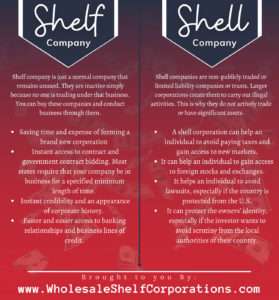If you are a business owner, then you already know that aging naturally is the perceived high road in business especially when it comes to funding. But what exactly should one do when in dire need for funding without the highly coveted track record spanning over years or even decades? While funding in such cases isn’t entirely impossible, it comes along with a myriad of challenges like high interests rates. That’s because lenders consider businesses that are relatively young as high risks. Such predicament shouldn’t really worry you because that is exactly aged or shelf corporations come into the picture.
What Is A Shelf Corporation?

A shelf corporation, also known as a shelf company, aged corporation, blank-check company or simply a ready-made company is basically a legally incorporated company with no activity. It is usually incorporated for one main purpose – to accumulate a rich corporate history. It can then be purchased by clients who wish to set up a business quickly without going through the usual hassle that comes along with incorporating a company. Such companies can literally be bought off the shelf which is in fact, why they are often referred to as shelf corporations.
Note that shelf corporations and shell corporations don’t refer to the same thing. For starters, shell corporations are illegal, while shelf corporations aren’t. That’s because shell companies are usually fictitious and are usually registered to launder money. Think of it this way. You go the uphill task of registering a company. You meet all the necessary obligations from taxation all the way to legal requirements. You then choose to do absolutely nothing with the company. A friend then shows up and requests you to sell the company to him. He’s impressed with how you’ve compiled over the years with taxes and pretty much everything else required of you. To that extent, your company easily qualifies for a shelf corporation.
Why Do People Buy Shelf Corporations?
As already mentioned, corporate history stands out as the main reason buy aged corporations. That’s not the only reason though. Other salient reasons include:
- Contract bids – in some jurisdictions, businesses can only bid on some contracts if they have been operational for a specified duration i.e number of years.
- Urgent cases – you may have stumbled upon a ‘deal’ that must be sealed days after reaching an agreement.
- VAT Number – This mostly applies to businesses in Europe. You cannot import goods without a VAT number. Aged corporations usually come in handy in such cases as they come complete with VAT numbers.
- Investors – Attracting investors is often easier if you have a track record and have been around for quite some time. Shelf corporations offer both perks.
Buying Shelf Corporations
You may have already noticed that the internet is awash with shelf corporations for sale. That’s a good thing because it means there are so many entities offering the service. Their competition is therefore, a huge plus for potential buyers. Make no mistake though. Some of the offers you come across may seem good but eventually turn out to be huge liabilities. As such, you have no choice but to conduct some due diligence before considering aged corporations for sale.
First off, keep in mind that when it comes to shelf corporations for sale, reputation is pretty much everything. There are companies in the market to sell aged corporations that have already done some business in the past. You may not know this unless you’re diligent and keen. Such shelf corporations may have incurred liabilities, a red flag which you must run away from by all means. Others may have attracted lawsuits too. Note that you’ll end up buying the liabilities and lawsuits immediately the shelf corporation is transferred to you.
Then there is the price factor. Here’s a simple rule that can help you. No price is cast on stone. In a nutshell, do not be afraid to bargain. Have an expert assist you through the process if for one reason or another you’re not so good at negotiating.
Knowing which pitfalls to avoid can come in handy when buying aged corporations. To be certain that a vendor is clean, ensure that the seller you’re buying from:
Keeps a detailed inventory and provides guidance on the corporation that best matches and fits your needs.
Is accessible and readily available for inquiries and rapid turnaround.
Guarantees and undertakes in writing that the aged corporation on sale has never been in active business before.
What Next After Buying A Shelf Corporation?
There are certain changes that become inevitable once you buy a shelf corporation. Such changes are important because they’ll affect the day to day running and affairs of the company. In that regard, note the following.
- Transfer of shares – transferring an aged corporation’s shares to the nominated purchaser is mandatory unless parties agree otherwise.
- Address – No corporate can be registered today without a physical address. This means that aged corporations on sale always come complete with their own addresses. Change the address immediately the company is transferred to you.
- Directors – This is just as important as transfer of shares. You’ll have to change the company’s current directors to new directors. As the purchaser, you should’ve already figure out the people you wish to appoint as directors by the time you buy an aged corporation.
- Change of name – You can opt to leave the name as it is or change it to a name you prefer.
- Constitution – Shelf corporations are typically registered with articles and memorandum of association. They are in simple words, ‘the term or rules’ within which the company will operation. That’s why they are also referred to as constitution. Be keen to amend the constitution the aged corporation you bought came along with.
You may have bought a shelf corporation before. That’s good for you because it means you already know a thing or two about taking the necessary precautions. Remember though that jurisdictions differ particularly on laws that govern corporate entities. With that in mind, it is important for you to be keen on the following factors in your bid to buy an aged corporation.
Tax Implications
There’s an old adage on taxes you certainly know of – Two things are certain in life – death and taxes. The adage is pretty much self-explanatory. It simply reiterates how important it is for one to pay taxes. Now when it comes to businesses, the implications on taxes are usually weighty. Of course this shouldn’t really worry you if you’re buying a company that has never transacted before. But what next after buying an aged company? If you make it active immediately you run it, then from that moment on, you have date with the taxman. That’s why you must familiarize yourself with the tax regime and laws of the state or country your company was incorporated in. It doesn’t matter whether or not you’re making profits.
In many countries, you have to file returns every year. This may sound unnecessary if you’re not making profits, but it isn’t. As a matter of fact, failing to file returns at the end of the year whether or not you broke even is big mistake. How else will the tax man know whether or not you should be taxed? Furthermore, some jurisdictions impose heavy penalties upon individuals and corporates that fail to file annual returns for purposes of taxation.
Business Structure
It goes without saying that not all business are the same. You must therefore, take time to find an aged corporation that best suits your needs. Think of it this way. Limited Liability Companies and Limited Liability partnerships are both legal entities. Their business structures are however, entirely different. Their fundamental differences may not mean much to a layperson. To experts though, the difference can mean so much in terms of many salient factors like profit sharing, tax implications and many other management issues.
Your main objective could be funding. You may therefore, be looking for shelf corporations with line of credit. What do you think would happen though, in the unlikely event of a lawsuit? You certainly would want a situation where your personal assets and that of the company would be treated differently. That is where limited companies and LLPs come in handy. They’ll keep you safe from the long hands of the law.
Experts
Never assume you know. This is especially the case if you wish to enter into a partnership with an individual or another corporate. Seek expert advice. You could be an expert in your own right. That fact notwithstanding it is still important to seek expert advice. That way, you’ll be able to see things from another expert’s perspective. You can then weigh your options well before making a decision. This is extremely important when it comes to aged corporations with line of credit.
The Legal Framework
Whatever you do, avoid by all means, brushing shoulders with the law. Any lawyer worth their salt will tell you for free that litigation is expensive. It is also time consuming. Fortunately, legal nightmares are very easy to avoid because all you need to do is comply. This may mean hiring a corporate lawyer to advise you accordingly. While many businesses owners consider such a move as a liability, it really is not. It is way easier to have a corporate attorney on retainer than hire one to defend or even institute a suit.
Unlike what many people think, attorneys are not all about lawsuits. They offer insight on so many other operational and management issues. For instance, you’ll need an attorney to advice you on contract clauses before executing them. You’ll also need an attorney to offer insights on other key factors like how to legal wind down a company after it has met its objectives.
Costs
Do your math. They say numbers don’t lie. Take your time to find the best deal in town. As already mentioned, there are so many companies offering aged corporations for sale. You wouldn’t know the best deal in town without comparing prices. That’s not all though, as far as costs are concerned. You’ll still have to take into account operational costs. That is, how much will you spend on changing salient features of the company once it is transferred to you? You should be able to come up with a figure before buying a shelf corporation.
There’s yet another angle people hardly consider when it comes to aged corporations. You could very well buy one today, run it for a month or two then receive an offer to sell it. This happens more than you may realize especially in competitive fields like technology and real estate. You’ll need to do your math on how much you can bag in the fortunate event an offer gets thrown your way.
Funding
This is where it gets interesting. People go for aged corporations mostly to make money. Whether you’re buying a shelf corporation to secure funding or to bid on a contract, the ultimate goal is usually to make money. This is a good thing because shelf corporations funding are extremely common. But even then, a corporate history is just one factor. It isn’t everything lenders consider far as aged corporations funding is concerned. In that regard, do your homework. You may have to crack some numbers on how you intend to stay competitive. This may force you to hire an expert or spend days coming up with the perfect plan. Whatever the case, take your time to impress potential lenders. Be keen on factors like breaking even and strategies on edging out competition.
Top 3 States In the United States where you can start your business using aged shelf corporations

1) Delaware: Delaware is one of the states that makes it more easier for any online business to thrive. As a result, the government can help you stay competitive in the e-commerce sector. The following are some of the advantages of starting a business in Wyoming:
- Delaware does not collect inventory taxes, personal property taxes, value-added taxes, or capital taxes; it protects the assets of company owners; and it has business-friendly laws that will attract investors to your company.
- Your privacy will be completely protected in Delaware, even if you do not want the members’ names to be listed in the filings.
2) Nevada: To protect the assets and privacy of the owners, Nevada has tight rules and a tax-free environment. The state boasts the lowest incorporation fees in the country, making it easier for entrepreneurs to get their company up and running quickly. The following are some of the advantages of starting a business in Wyoming:
- The state keeps the information about corporations private and does not gather much data to share with the IRS.
- Nevada has asset protection regulations in place to secure the owner’s assets from prying eyes.
- The state’s annual renewal charge is likewise much lower.
- In Nevada, you can choose to remain anonymous to safeguard your privacy.
- If you start your firm in Nevada, there are no requirements for annual meetings or operating agreements.
- Case laws are used by the state’s court system to resolve conflicts.
3) Wyoming: When compared to many other states in the United States, Wyoming has the lowest administrative costs. It’s one of the reasons Wyoming is such a desirable destination for enterprises and corporations. Wyoming also has the greatest asset protection laws in the country. The following are some of the advantages of starting a business in Wyoming:
- There are fewer beginning costs.
- Wyoming has no income tax, but it does have a slew of asset protection regulations, and it devotes a significant portion of its budget to fiscal health.
Now let’s look at what distinguishes Shelf Company from Shell Company
We’ve seen numerous people use the terms “Shell Company” and “Shelf Company” interchangeably. These, however, are not the same. Keep in mind that both entities have distinct roles and functions in the market, and they can be employed to benefit a corporation or a business. Let’s take a closer look at the differences between the two terms:
What exactly do we mean when we say “Shelf Company”?
A shelf company is a firm that is founded and then placed on a shelf to age for a set amount of time. This firm can then be sold to a prospective buyer who wants to buy it, and the individual will not have to go through the steps of forming a new business or company. In a nutshell, a shelf company is created with the intention of being sold so that it can continue to operate.
As a result, shelf firms can save a person’s time by avoiding the incorporation process. It also provides numerous benefits to that company. For example, it can assist in obtaining financing for the company, as well as providing credibility to the corporation.
What exactly do we mean when we say Shell Company?
A shell company, according to the definition, acts as a vehicle for a company’s transactions without having any operations of its own. A shell company’s main aim is to avoid paying taxes.
It has no physical existence and isn’t necessary for the economic value to exist. It does not own any of the businesses’ assets.
Here is a short infographic to show the difference between the two:

Wrap Up
Much has been said and written about shelf corporations. Are they legal? Do they still work? How much do they cost? Who buys them?..and so on. When all is said and done, aged corporations are legal. They work. And yeah, you may need one as explained here in above. Remember though that buying an aged corporation is like any other transaction. You have no choice but to be extremely cautious and diligent. You also have to be keen on factors like tax implications and the legal framework within which your company will operate. The upside here is, there are experts who can help you with such details. Be sure to consult them.



















